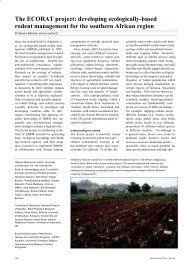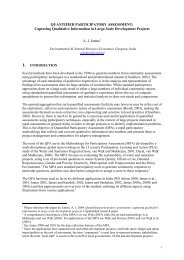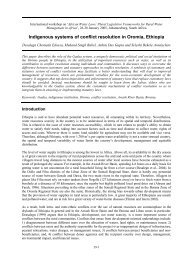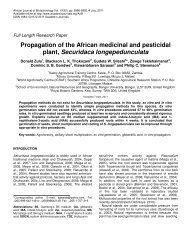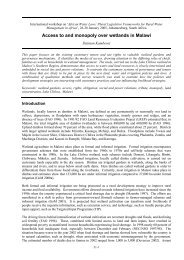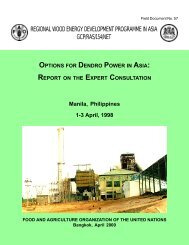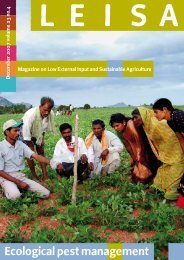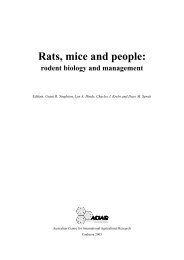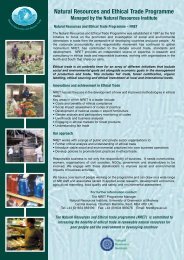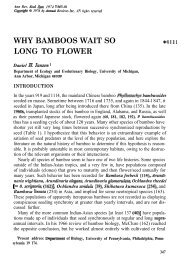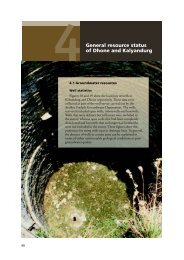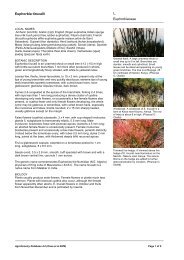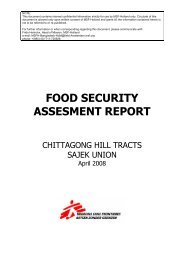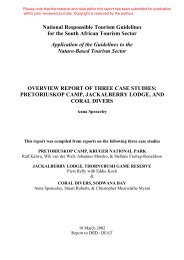Access to Rural Non-Farm Livelihoods - Natural Resources Institute
Access to Rural Non-Farm Livelihoods - Natural Resources Institute
Access to Rural Non-Farm Livelihoods - Natural Resources Institute
You also want an ePaper? Increase the reach of your titles
YUMPU automatically turns print PDFs into web optimized ePapers that Google loves.
qualified teachers 46 , but this remains an area of concern. Efforts <strong>to</strong> increase the number of<br />
women teachers have been attributed <strong>to</strong> improvements in retaining girls in school 47 , but there<br />
are still problems in the enrolment of orphans who must work <strong>to</strong> survive, as well as children<br />
from fishing and pas<strong>to</strong>ralist households, and the cost of uniforms and books, etc. is a barrier<br />
<strong>to</strong> some.<br />
In 1994/5 there were 18 government aided and 22 private secondary schools in the district,<br />
although only four schools offered A level courses. There is also a Teacher Training College<br />
at Bikira which trains primary school teachers, although many trainees come from outside the<br />
district as well. There is a government aided technical training institute at Kammengo which<br />
offers courses in mo<strong>to</strong>r vehicle mechanics, carpentry and joinery, bricklaying and masonry,<br />
and electrical installation – it has been further supported by the RDDP, but is under-utilised.<br />
Under the RDDP a “resource centre” was also constructed at Sanje, but the district has<br />
proved unable <strong>to</strong> run it, and thus far the government is unwilling <strong>to</strong> take it over, so its future<br />
is unclear.<br />
Since the mid 1980s the Catholic Banakarole Brothers have operated a training centre at<br />
Kiteredde offering courses in carpentry and joinery and masonry <strong>to</strong> both school leavers and<br />
school dropouts from all over the country. They are also sometimes able <strong>to</strong> provide “some”<br />
support in the form of <strong>to</strong>ols, etc. <strong>to</strong> graduates. There are also private technical institutions at<br />
Lwamaggwa and Bikira and a farm school at Mbuye in Lwanda Sub-County. Many local<br />
craftspeople and mechanics also train small numbers of youth and orphans, sometimes on the<br />
job, sometimes for free as a community service, sometimes in exchange for labour, but often<br />
in exchange for a cash payment, which may be substantial in the case of a valuable skill<br />
learned from a reputable practitioner. Standards and conditions are highly varied, with<br />
reputation and word of mouth being important in choosing where <strong>to</strong> apply for an<br />
apprenticeship. Several times a year the Trade Development Officer organises two <strong>to</strong> three<br />
day business skills seminars for businesspeople and would be entrepreneurs. Topics cover<br />
management skills, basic account, etc., but although they are free, attendance is poor as<br />
participants must fund their own transport, etc. The 1994/5 – 1999/2000 DDP includes plans<br />
for support <strong>to</strong> adult literacy, but it was not clear how well these had been implemented.<br />
Shepherd (2000b) found that formal employment increased with <strong>to</strong>tal household education,<br />
and that more educated households were less likely <strong>to</strong> depend primarily on agriculture, with<br />
such households more likely <strong>to</strong> be involved in crop processing than other activities 48 .<br />
Dependence also decreased with <strong>to</strong>tal household education, perhaps in part because<br />
households with lower dependency ratios were better able <strong>to</strong> support their children in school.<br />
46 Such as the provision of cooked lunches at midday.<br />
47 It is also hypothesised that improvements in sanitation in schools, specifically the construction of adequate<br />
latrines and access <strong>to</strong> water, is important in encouraging/allowing girls <strong>to</strong> stay in school when they start<br />
menstruating (Shepherd, 2000b).<br />
48 Although households involved in crop processing had a range of educational levels.<br />
22



